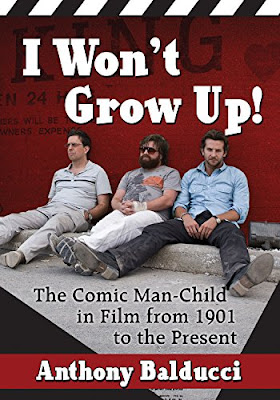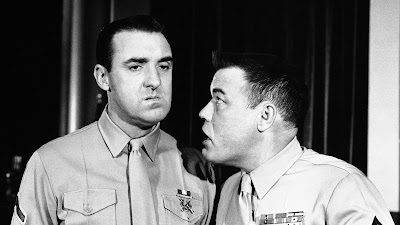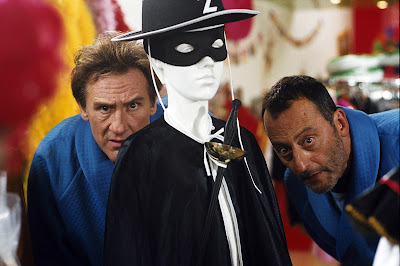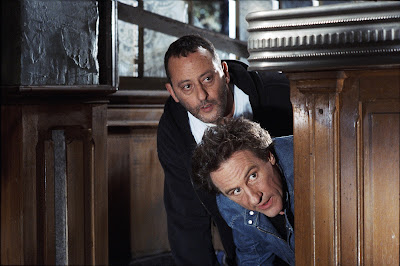The man-child in films is obviously a favorite topic of mine.
Yung-Hang Bruce Lai, a film researcher and critic, has written an interesting essay about a particular type of man-child - the virtuous man-child. Click here for the full text.
The focus of Lai's essay is a Chinese comedian, Wang Baoqiang, who became popular playing a kindly comic bumpkin in Lost on Journey (2010). The bumpkin, Niu Geng, is a humble worker at a rural dairy. A train trip brings Niu together with Li Chenggong (Xu Zheng), the CEO of a toy company. Li is presented as a symbol of modern capitalism. He is callous, cynical, rude and arrogant. We have seen him in an earlier scene berating his staff and calling one of his employees "retarded." He has lost old-fashioned virtues in his obsessive pursuit of money. In contrast, the rural dairy worker is a throwback to simpler and more innocent times. He has not been corrupted by the high-stress demands of the modern adult world. He possesses a goodness and purity that is sorely lacking in today's career-driven men. Baoqiang went on to play a similar character, Wang Bao, in Lost in Thailand (2012). Lai wrote, "Niu and Bao’s innocence and kindness suggest that corrupt adults should learn from children." During their journey, Niu manages through example to teach Li about trust, honesty and generosity. Li feels great sympathy for a blind girl and pays for surgery to restore her sight. So, as Lai wrote, ". . . a mature man learns from his childish buddy to become a better man."
The idea of pairing a boyish and softhearted man with a tough and cynical man can be traced as far back as Steamboat Bill, Jr. (1928). Bill Canfield (Ernest Torrence),a tugboat captain, sets out to toughen up his son, Bill Jr. (Buster Keaton). A pretty young woman, Kitty King (Marion Byron), inspires the younger Canfield to heroic action. His father, proud of Bill Jr.'s heroism, regrets his misjudgment of his son and softens in his feelings towards him.
The formula was applied with extraordinary success to Gomer Pyle.
A gruff sports reporter (Walter Matthau) and a sensitive news writer (Jack Lemmon) become mismatched roommates in The Odd Couple (1968).
Filmmaker extraordinaire Francis Veber took the concept to great heights with a long series of films: L'emmerdeur (1973), La Chèvre (1981), Les Compères (1983), Les fugitifs (1986), Le Dîner de Cons (1998) and Tais-toi! (2003).
Let's look, for example, at the plot of Les fugitifs. François Pignon (Pierre Richard), an unemployed salesman, desperately needs money to obtain medical care for his young daughter Jeanne (Anaïs Bret), who has been mute since the death of her mother. François attempts to rob a bank, but he is too clumsy and slow to get away before the arrival of the police. He randomly takes a tough and burly customer, Jean Lucas (Gérard Depardieu), as a hostage. The police, who recognize Jean from his notorious past as bank robber, are quick to assume that he is the criminal and François is the victim. This assumption could not be more unjust. Just that morning, Jean completed a prison sentence and swore to become a law-abiding citizen. François and Jean escape capture and go on the run together. In the process, Jean develops a strong bond with François and his young daughter.
The formula is used to perfection in Tais-toi! (in English: Shut up!). Ruby (Jean Reno) and Quentin (Depardieu) are cellmates in a prison. Ruby is a cynical gangster who has a reputation for being a lone wolf. He is much different man than Quentin, a dim-witted petty thief who is irritatingly gregarious. Ruby cannot believe that anyone can be as stupid as Quentin. He assumes that the talkative and friendly Quentin is a police plant who is trying to learn where Ruby hide his stolen loot. The two convicts escape from prison together. As fugitives, the pair must cope with an endless series of problems. Ruby comes to appreciate Quentin for being caring, honest, faithful, trusting and genial. He learns through his new companion the value of friendship.
And then, of course, we have Planes, Trains and Automobiles (1987), which shares many similarities with Lost on Journey. Let's examine the plot. Neal Page (Steve Martin), an advertising executive, has strictly businesslike qualities. He is logical, organized and controlled. After attending a business meeting in New York City, he is anxious to return to his family in Chicago to celebrate Thanksgiving. On the plane, he sits next to Del Griffith (John Candy), a cheery and talkative shower ring salesman. The flight is canceled due to a blizzard and Neal and Del must take to the road together to get home. Del is an uninhibited in his great love of people. He is carefree and sometimes careless. His carelessness with a cigarette causes him to accidentally set their rental car on fire. Neal seeks efficient solutions to problems and is impatient with Del's foolish approach to problems. But, in the end, Neal softens just as his many comic forebearers. He ends up inviting Del to join his family for their holiday dinner.
Speaking of the holiday, I hope that everyone had a happy Thanksgiving.











-04.jpg)
-09.jpg)













.jpg)






No comments:
Post a Comment